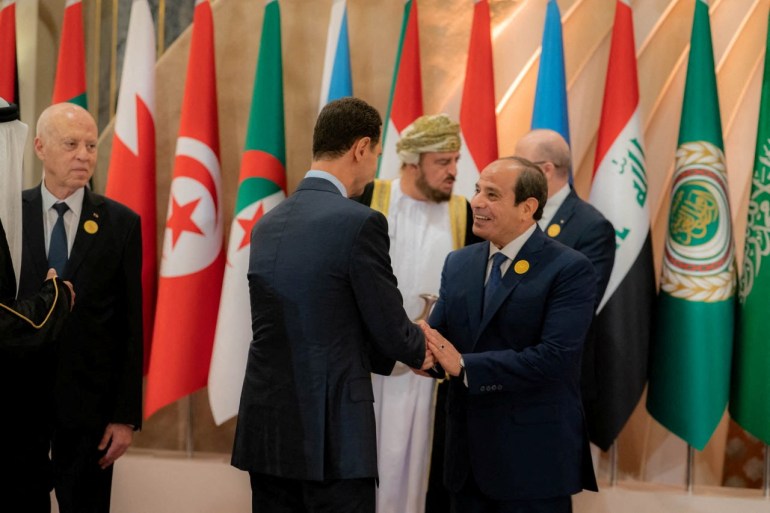‘Conundrum’: How the US is dealing with Assad normalisation
As the Arab world normalises relations with Syria, US pushes for concessions from the Assad government, analysts say.

Washington, DC – Syrian President Bashar al-Assad is officially back in the Arab fold. After more than a dozen years of ostracism, he was warmly embraced by regional leaders at the Arab League summit in Jeddah, Saudi Arabia, this week.
This once-unthinkable comeback creates a “conundrum” for the United States, which continues to oppose normalisation with the Syrian government but has not been able to stop its Arab partners from rekindling ties with Damascus, analysts say.
Keep reading
list of 3 itemsUS says it will not normalise relations with Syria’s Assad
Syria’s Assad arrives in Saudi Arabia in first visit since war
US officials have said that, while they do not back normalisation with al-Assad, they share the goals that restored relations could bring, including expanding humanitarian access to conflict-torn regions, combating ISIL (ISIS), reducing Iran’s influence and countering the trafficking of the drug Captagon.
The US position under President Joe Biden reflects a “tricky, gnarly, complex challenge”, said Mona Yacoubian, vice president of the Middle East and North Africa centre at the US Institute of Peace (USIP), a think tank funded by the US Congress.
“The Biden administration perhaps has made a calculus that, ‘Okay, the region is moving forward with normalisation. Perhaps the issue then is to get something for it, get concessions,'” Yacoubian said.
But without accountability for Syrian government abuses, she added, Washington will not normalise its relations with Damascus or ease its heavy sanctions, including the blocking of foreign reconstruction funds.
“Frankly, given Assad and given his role and given the lack of accountability, it’s very hard — if not impossible — to imagine that the US is going to shift its position with respect to either normalising ties or yielding on the issues around reconstruction, lifting sanctions,” Yacoubian said.
She pointed out that Washington has maintained a similar posture towards other countries for decades, including Cuba and North Korea.
Al-Assad’s return
Syria was suspended from the Arab League and left isolated by regional power brokers in 2011 after its crackdown on protests during the Arab Spring, a wave of anti-government demonstrations across several countries in the region that year.
That heavy-handed security approach in Syria turned into a protracted war, killing hundreds of thousands of people and displacing millions.
In recent years, government forces recaptured much of Syria with the aid of Russia and Iran, and local ceasefires have maintained relative calm as parts of the country remain under the control of various rebels and armed groups.
This month, Syria was readmitted into the league. Al-Assad landed in Saudi Arabia on Thursday to participate in the organisation’s summit a day later, following weeks of diplomatic meetings between Syrian and Arab officials.
“We do not believe that Syria merits readmission to the Arab League,” US Secretary of State Antony Blinken said last week.
“It’s a point we’ve made to all of our regional partners but they have to make their own decisions. And our position is clear: We are not going to be in the business of normalising relations with Assad.”
Still, Blinken said Washington and its Arab allies have broader common objectives in Syria.
Arab countries “believe that they can pursue these objectives through more direct engagement”, the top US diplomat added. “We may have a different perspective when it comes to that, but the objectives that we have, I think, are the same.”
While al-Assad’s re-admittance into the Arab League was on full display in Jeddah, the normalisation drive has been ongoing for years.
The United Arab Emirates — a top US ally in the Gulf region — reopened its embassy in Syria in 2018, and last year, it became the first Arab state to host al-Assad since the start of the Syrian war more than 10 years ago.
Washington has not been able to prevent its allies from rebuilding ties with al-Assad’s government despite public opposition to normalisation.
Steven Heydemann, director of the Middle East studies programme at Smith College, said Washington has been reluctant to make the necessary “diplomatic investments” in Syria — including using third-party sanctions as a deterrent — to dissuade allies from normalising with al-Assad.
“So the fallback position is: ‘Well, we disagree with what you’re doing. We feel it’s inappropriate, immoral, unethical, strategically unwise. But we are not going to stand in your way. We simply hope that you are able to get something out of the concessions you’re offering through the normalisation process to this regime,'” Heydemann said, summing up the US stance.
US Congress vs Assad
Al-Assad has become a villainous figure, especially in the West, amid accusations of rampant human rights abuses and war crimes, including forced disappearances of dissidents, the bombing of civilian areas and use of chemical weapons.
In the US Congress, legislators are already mobilising to tighten sanctions and push back against the reintegration of al-Assad in the region.
Last week, a group of bipartisan House representatives introduced a bill dubbed the Assad Anti-Normalization Act, which aims to “hold the Assad regime, and its backers, accountable for their crimes against the Syrian people and deter normalization with the Assad regime”.
The bill is a sign that Congress will likely push Biden and future administrations to fully enforce Syria sanctions. But whether the US also applies the sanctions to its Arab allies will be a “litmus test” of how serious it is about pushing back against normalisation, Heydemann said.
However, Joshua Landis, director of the Center of Middle East Studies at the University of Oklahoma, questioned the utility of US sanctions and Washington’s entire approach to Syria.
He said Washington has acknowledged that it cannot topple al-Assad and its sanctions are hurting the Syrian people, not top government officials.
“The Arab governments, by normalising Syria, realise that Assad is not going away. And America, of course, understands that, too,” Landis told Al Jazeera.
“But it’s clinging to its human rights, in part because it doesn’t cost America anything to cling to this. You can choose your friends, but you can’t choose your neighbours. And so America has the luxury of being able to stand on principle.”
Landis cited comments from 2013 by then-deputy CIA Director Mike Morell saying that Washington does not want to see the Syrian military collapse amid the rise of al-Qaeda in the country.
Landis added that actively opposing normalisation and maintaining pressure on Damascus would work if the US had a plan for getting rid of al-Assad.
“But they clearly don’t. They left Assad there intentionally. And what are they doing with these sanctions? They’re not hurting Assad,” he said.

US influence
Regardless of the future of US policy on Syria, the fact that Arab states are normalising with al-Assad is a sign of the receding US political influence in the region, experts say.
While the US maintains a military presence across the Middle East and in Syria itself, it is no longer the sole power broker in that part of the world.
That was demonstrated plainly earlier this year when Iran and Saudi Arabia struck a deal that was finalised in China to reestablish diplomatic ties.
Heydemann said that while Washington’s military footprint in the Middle East remains strong, it is pivoting its foreign policy priorities to Asia and the great power competition with Beijing.
“That has left regional actors bearing a larger share of the regional security burden and they’re responding to that burden in ways that the US might not prefer,” he told Al Jazeera.
Yacoubian of the USIP said the Middle East is entering a “multipolar era”, where regional players are pushing to solve their own problems.
“The normalisation with Assad is only one example,” she said.
For Landis, the waning US influence is of Washington’s own doing. “They have done the wrong thing time and time again,” he said.
“A big elephant like America can ruin a country like Iraq, or throw chaos into Libya, munch Afghanistan and withdraw without any progress and make all these promises about bringing democracy and human rights to regions when it’s actually the opposite. And eventually, people get tired of this.”